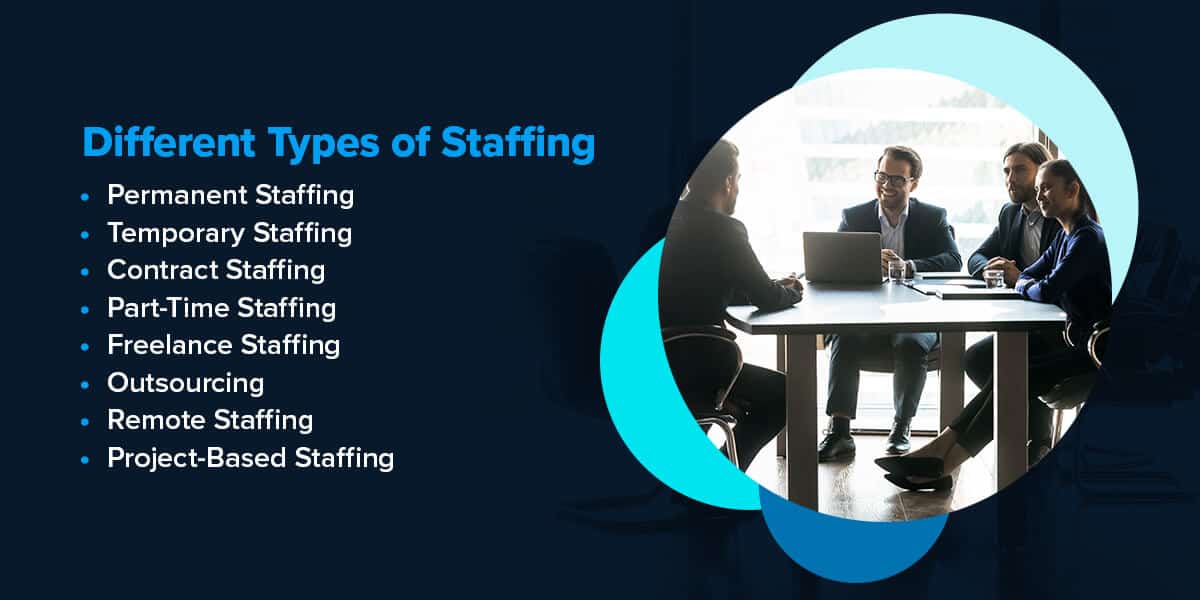Table of Contents - Quick Links
Are you intrigued by the world of staffing and the diverse approaches to meet the ever-evolving demands of the workforce? Understanding the different types of staffing strategies employed by different types of staffing companies can provide valuable insights into the modern employment landscape.
Let’s delve into the intricacies of staffing, from temporary and permanent placements to specialized staffing strategies. By gaining a deeper understanding of these concepts, you can navigate the dynamic realm of staffing and make informed decisions for your career or business. Learn about the different types of staffing and what it means to be a staffing company in today’s competitive market.
Wondering about Different Staffing Types?
Understand the different types of staffing and discover what suits your business with Porter Capital.
What Is a Staffing Agency?
A staffing agency, also known as a staffing company, is an organization that specializes in connecting employers with qualified individuals seeking employment. These agencies act as intermediaries, facilitating employers’ and job seekers’ recruitment and placement processes.
The primary responsibility of a staffing agency is to source, screen, and select candidates who match the requirements and preferences of the hiring companies. They maintain a pool of potential candidates using various sourcing methods such as job postings, networking, and referrals.
One of the key advantages of working with a staffing agency is its expertise in matching job seekers with suitable employment opportunities. They have in-depth knowledge of the job market and industry trends, enabling them to identify the right talent for specific roles.
It’s important to note that staffing agencies come in different forms and cater to diverse needs. Some agencies specialize in certain industries or job roles, while others offer a broader range of staffing services. This variety contributes to the array of types of staffing strategies organizations use.

Different Types of Staffing
Organizations can employ several types of staffing based on their specific needs and circumstances. By exploring these various types of staffing companies, you’ll gain valuable insights into organizations’ different strategies and approaches to managing their workforce effectively.
Permanent Staffing
As the name suggests, permanent staffing involves hiring employees for long-term, ongoing organizational positions. Organizations opt for permanent staffing when they require a consistent workforce to fulfill regular job roles and responsibilities.
Permanent staffing strategies can include full-time and regular part-time employees, direct hires, and internal promotions. This staffing strategy is often accompanied by benefits such as healthcare coverage, retirement plans, and career growth opportunities.
What sets permanent staffing apart is the commitment and investment involved. Employers carefully select candidates with the desired skills, experience, and cultural fit for the organization. Unlike temporary or contract staffing, permanent employees become integral members of the company’s workforce.
Temporary Staffing
Regarding flexibility, adaptability, and cost-effectiveness, temporary staffing takes the spotlight. This type of staffing involves hiring individuals for a specific period or project, giving organizations the agility to respond to fluctuating demands.
Temporary staffing can include seasonal, on-call, or as-needed employees, day laborers, and skilled temporary workers. Temporary staffing helps employers quickly scale their workforce up or down based on business needs, whether it’s seasonal work, short-term projects or filling in for absences.
What defines temporary staffing is its transient nature. Unlike permanent staffing, temporary employees do not have an ongoing employment relationship with the organization. However, they can bring fresh perspectives, specialized skills and contribute to the overall efficiency of the workforce.
Contract Staffing
Contract staffing provides short-term solutions for organizations needing specialized expertise or temporary support. It involves hiring individuals on a contractual basis, with clear definitions of duration and scope. This allows organizations to access skilled professionals for short assignments or specialized projects without long-term commitments.
Independent contractors, consultants, and temp-to-hire workers are examples of contract staffing. Contractors, often self-employed or hired through agencies, are responsible for their taxes and benefits. The distinguishing factor of contract staffing is the focus on specific skills and deliverables outlined in contracts.
Part-Time Staffing
Part-time staffing offers a flexible employment option by hiring individuals for fewer hours than full-time employees. It allows organizations to accommodate varying workloads and schedules while promoting work-life balance. Employers can optimize their workforce by using part-time staff during peak hours or specific shifts, reducing labor costs without compromising productivity.
Examples include regular part-time employees, weekend or evening staff, and job-sharing. This strategy is common in retail, hospitality, and healthcare industries. Part-time employees may have fixed or as-needed schedules, providing flexibility, shift coverage or cost savings.
Freelance Staffing
Freelance staffing offers flexible work arrangements by hiring independent professionals on a project-by-project basis. It provides organizations access to diverse skills at a lower cost than full-time employees. Freelancers, also known as independent contractors or gig workers, bring specialized expertise.
Organizations can tap into this talent pool for temporary or external expertise in specific tasks or projects. What distinguishes freelance staffing is the independent nature of the working relationship. Freelancers operate as their own business entities, offering services to multiple clients while maintaining flexibility in their work arrangements.
Outsourcing
Outsourcing is a staffing strategy that involves contracting third-party companies or service providers to handle specific functions or tasks on behalf of an organization. It allows businesses to delegate non-core activities and focus on their core competencies.
Common areas for outsourcing include IT services, customer support, manufacturing, and payroll administration. Whether a company uses offshore, nearshore or onshore outsourcing, each provides a strategic solution that optimizes organizational operations and efficiency. It offers a way to access external expertise and resources while leveraging the strengths of dedicated service providers.
The transfer of responsibilities to external entities is what defines outsourcing. Organizations leverage outsourcing to access specialized skills, reduce costs and improve efficiency.
Remote Staffing
Remote staffing has become a vital component of the modern workforce, providing opportunities for organizations to build agile and globally distributed teams. Remote staffing refers to hiring individuals who work outside the traditional office environment, often from their homes or other remote locations.
This type of staffing is beneficial for roles such as software development, content writing, and virtual customer support. Organizations gain access to a broader talent pool and reduced overhead costs while employees enjoy flexibility and autonomy.
Unlike other staffing strategies, remote staffing allows organizations to tap into a global talent pool. Organizations can hire the best candidates regardless of geographical constraints, enabling access to diverse skills and perspectives. Remote employees benefit from the flexibility of working from anywhere, avoiding commuting, and achieving a better work-life balance.
Project-Based Staffing
Project-based staffing offers a targeted approach to staffing, focusing on specific organizational projects or initiatives. This type of staffing involves hiring individuals or teams to work temporarily until the project is completed.
Project-based staffing is commonly used in construction, software development, event management, and marketing industries. It allows organizations to bring together a dedicated team with specialized knowledge, collaborate on project objectives and meet project milestones within defined timelines.
What sets project-based staffing apart is its emphasis on short-term, goal-oriented assignments. Organizations can assemble a project team with the necessary skills and expertise required for the specific project, ensuring optimal efficiency and effectiveness. Project-based staffing allows for allocating resources based on project demands, avoiding the need for long-term commitments.
Get Started With Porter Capital’s Staffing Resources
Understanding the different types of staffing is essential for both employers and job seekers. Whether you’re considering permanent staffing or outsourcing, you can optimize your workforce, access specialized skills and enhance productivity by leveraging the right staffing strategy.
If you’re a staffing company looking to streamline your cash flow and accelerate your growth, Porter Capital is here to help. As one of the leading financial companies in the Southeast, Porter Capital offers working capital solutions, AR financing, funding, and invoice financing to companies across multiple industries.
Contact us online today to learn more about our invoice factoring services for staffing agencies or explore our staffing resources for additional information. Take control of your staffing success with the proper financial support.




